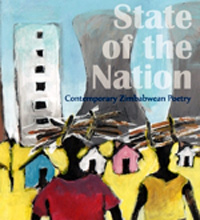When I received this book, State of the Nation: Contemporary Zimbabwean poetry, its very pointed title
hinted that it was a project on Zimbabwe now as seen by
its various poets. I know that the state of our beloved but beleaguered
nation, Zimbabwe is now well known. The term ‘Zimbabwean crisis’
has even been spawned. Whatever way you look at it, the Zimbabwean
crisis is characterized by serious food shortages, lack of jobs,
rampant underpaying of civil servants, acute brain drain and the
general collapse of public amenities.
The causes of this crisis in Zimbabwe
fall desperately - and untidily too - between an oppositional view
and the establishment/government view. A particular incident associated
with the genesis of this crisis is the payment of hefty gratuities
to the liberation veterans from ZANLA and ZIPRA, resulting in the
first substantive fall of the Zimbabwean dollar in 1997.
In 1998 Zimbabwe intervened in the
Congo war on the side of the government of Laurent Kabila against
some rebels; this also had very negative impact on the Zimbabwean
economy. In 1999 the Zimbabwean government embarked on what its
opponents in the opposition and the West have called the ‘chaotic
land reform.’ The ‘new farmers’, as the beneficiaries
of the land reform have come to be known in Zimbabwe, have not been
able, within the interim; to produce enough for the nation to consume.
The West hit Zimbabwe with the so-called
‘targeted’ sanctions, stopping the government leadership
of Zimbabwe from traveling abroad. However in due course it became
obvious, as categorically admitted in Article IV of the Zimbabwe
Global Political Agreement document of September 2008, that the
sanctions were not necessarily targeted (as Zimbabwe cannot receive
the balance of payment from the IMF and institutions related to
Britain.)
But the Zimbabwean government has always
projected their own side of the story. First, they argued that the
international diatribe against President Mugabe was basically because
he took land from the former white settlers and distributed it to
Africans to fulfill the long-standing cause of the 1970s liberation
war. They argued further, that the British colonial policy created
the social imbalances in Zimbabwe in the first place and that the
problem in Zimbabwe was not about the rule of law since the West
has remained silent in the face of worse suppression from elsewhere
on the continent. They also claimed that the opposition was a puppet
of the West helping to further the disfranchisement of the black
people of Zimbabwe and that through the invitation and persuasion
of the opposition; the west has slammed Zimbabwe with sanctions.
Therefore, a book like State of
The Nation that boldly positions itself to look our woes in
the eye raises great expectations. Poets are seers and from them
we want to know ‘where and when the rain began to beat us.’
The editors did well to ask each poet to start with each a testimony
on what it meant to be a poet, and sometimes a Zimbabwean poet.
If you cannot read the poems, you can go for the narratives - and
sometimes, as in the cases of Emmanuel Sigauke, Nhamo Mhiripiri,
Ignatius Mabasa and Ruzvidzo Mupfudza, you can go for both.
But then I must state that this cannot
be an out-and-out book review because I know and am known to most
of the poets in here. I know the fires that begat the red brick.
Reading them is like meeting again in a new country under a new
sky. To me, most of these are both poets and people.
Probably the most unique thing about
this book is that it has poets from Zimbabwe who are still very
active. For instance Christopher Mlalazi has just won an ‘honourable
mention’ in the latest Noma awards with his book: Dancing
With Life: Tales from The Township. Noma is a greatly prized
literary award acrossl Africa. Mlalazi is also a recent winner of
NAMA, a prestigious national award. When I wrote him to congratulate
him on the Noma and pointed out that he had now won both Nama and
Noma, he wrote back: “Ngiyabonga baba… Now I
want MANA (money).” Even his poetry is like that, spontaneous
and hard hitting. In A soundless song’, a goat is
described as ‘mercilessly tearing at the petticoats of a tree
unable to flee’.
I see that Ruzvidzo Mupfudza’s
personae have not, unlike us, left the bars. In the first two poems
I see it and agree with Ruzvidzo that the region between wakefulness
and sleep is a zone in which one sees further than the eye. At that
moment, one’s sins (and those of people behind and ahead of
us) coagulate into one event. And, ah, Ruzvidzo still sees Nehanda
too!
Ignatius Mabasa’s ‘problem’
about which language to use (or not to use) is not really a problem.
Good translations (as Mabasa has done with poems like ‘Cavities’
and ‘Concrete and plastic’) will serve us well. Having
seen these poems before in the original Shona, I dare say they have
even gained extra subtlety. Consider Mai Nyevero’s ‘tan
thighs’ and how she ‘laughs like a hyena.’ I actually
see her and suffer. Harare is teeming with such women. I wonder
why Mabasa did not include a piece on baba vaNyevero. Of
course, I cannot run away from the fact that Mabasa’s strong
point is the Shona language, rendering him one of the more successful
writers of our generation with his novels, Mapenzi and Ndafa
Here?
Nhamo Mhiripiri and his wife Joyce
Mutiti are Zimbabwe's writing couple. I do not know if we have another.
We must have more. In college we saw them courting, writing and
smoking together. We wondered why they didn't fall on each other
and fight because discussions at the Students Union tended to end
in fistfights. They didn't give us that opportunity. Nhamo's pen
is conscious of ideology and theory. Joyce's is private. Today you
still see them together either at the Book Fair or the book launches
in Harare.
In his own testimony, John Eppel makes
the crudest series of claims and accusations that I have ever heard
from one of us. First, Eppel says the late Yvonne Vera, ‘like
all Shona writers with ZANU PF sympathies (was) still in too much
denial to tackle the shameful period” (of Gukurahundi) and
therefore Vera’s The Stone Virgins ‘is abject
cowardice.’ Really?
I have quietly noticed, over the years,
that John Eppel is decidedly anti Shona. Most of his bad characters
have to be Shona! Everywhere Eppel’s Shonas are senselessly
clobbering and haranguing either a white man or a hapless Ndebele.
Eppel also says that nobody includes
him in the bibliography of Zimbabwean writers. He even claims that
no contemporary of his; Mungoshi, Zimunya, Hove, Chinodya, Dangarebga,
Chirikure… ever notices him except Julius Chingono! But then
Eppel admits, strategically: ‘generalisation is a tool of
the satirist.’ Maybe.
The five poems by Charles Mungoshi
crawl all over you like ants from the underworld. As you read his
poems you have a feeling that you are working your difficult way
around boulders, towards some treasure. In 'A Kind of Drought' the
spirit is weak because one has been lied to, cheated and finally
deserted by fellow humans (and maybe especially by the leaders)
and what remains are roads, because they do not lie and trees too,
because they remain the same old faithful parents and one can do
many things with trees, including going round and round and finally
dying safely under them. And as the spirit wanders, you wish you
could come to a river.
Dambudzo Marechera’s poems, given
to the editors by one Betina Schmidt, are dedicated to Betina and
are about Betina. They remind one of Marechera’s earlier poems,
the Amelia poems. Of them Marechera once said:
‘Amelia’s presence
in the flat inspired me to write the sonnets. When she had been
in the flat and then left, I would still feel her presence, and
any item she had touched could give me the first line for a poem.
Or just the emptiness… the flat felt so completely empty,
and it is this emptiness which is all around me which I have to
grab by the collar and put into a poem.’
Nearly all the poems about exile in
this book seem to insist on the fact that exile is more dangerous
than home. These poems seem to be in the majority with the outstanding
being Chenjerai Hove’s Identity, NoViolet Bulawayo’s
Diaspora, Tinashe Mushakavanhu’s Tomorrow is long
coming, Kristina Rungano’s Alien somebody and
Amanda Hammar’s Exiles. If it is not the loneliness,
it is the anxiety or the downright confusion that comes close to
declaring that one has no country because things are currently unwell
in one’s country.
Amanda Hammar’s reminiscence
is the most uplifting narrative in this book, if you are not easily
confused. What is a Zimbabwean poet, Kizito Muchemwa once asked
Amanda Hammar in Uppsala in 2009. ‘Does location matter; does
exile/proximity make one less or more Zimbabwean; what it is we
can or should, or should not, write about, or should that even be
a question at all?’ And Amanda Hammar’s answer, which
comes after a long search is: ‘I am no longer solely defined
by my Zimbabweanness. While for some, such a condition may seem
unremarkable, for me it is both a new sensation and a big and painful
admission.’
Then you realize that this book is
also about identity. In Europe, Mushakavanhu’s persona feels
like ‘a dark presence’ and his ‘coal black hand
tightly clasping’ the long white fingers of a half-desired
white wench cause heads to turn on the streets of Europe.
In her narrative, Jennifer Armstrong
says she writes as a poet and not as a white girl. She says 'the
black white history of Zimbabwe (and Rhodesia)' has given us 'the
remarkable and highly dubious gifts of race and gender.' And her
shortest poem goes:
I don't think
my race
will win
this race
although it might
come second
It is refreshing to come across the
new voices; Beavan Tapureta, Tinashe Muchuri, Batsirai Chigama,
Josephine Muganiwa... voices associated with the spoken word at
the Book Cafe and the Zimbabwe-Germany society.
Maybe Emmanuel Sigauke's poems stand
out for not going necessarily for the 'state of the nation'. They
are not about what I need from my country and government but are
about what I did and may do. His poems as in his book Forever
Let Me Go are about personal journeys from the past to the present.
Poems about what could I have been had I not been married to you
and about the dramatic happenings in distant villages and the zinc
roofed houses that we didn't and have forgotten to build.
My worry though with most Zimbabwean
poetry since And Now The Poets Speak of 1982, is the prevalence of melancholy. Our poets
are yet to find an idiom that redeems, regardless of the well-known
woes. The poetry of Jorge Rebelo and Jose Craveirinha are an example
of poets who, while chronicling the ills of their society, reflected
also on what they should offer. They went beyond the realm of 'look
what they have done to me' and began to show 'what we have to do
about it'. I honestly believe that Zimbabwe is not the worst and
last place God made. We shall overcome.
Nevertheless, poets Tinashe Mushakavanhu
and David Nettleingham have done well to put together the first
major anthology of Zimbabwean poets writing in English since And
Now The Poets Speak. And in both cases, the poets are concerned
about the state of their nation. Mushakavanhu walks with a spring,
head up, chest out and before he talks, he rubs his hands together
like the soothsayer that he is. Somewhere in some uncomfortable
weather we once talked about how, one day, he was to become Zimbabwe’s
youngest publisher. |

![African Writing Online Home Page [many literatures, one voice]](http://www.african-writing.com/nine/images/logo9.png)









![]()
![]()


